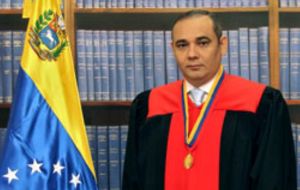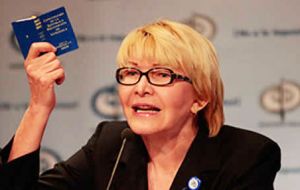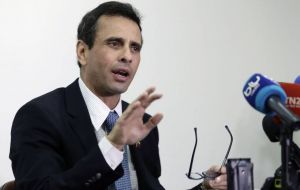MercoPress. South Atlantic News Agency
Domestic (military) and foreign pressure force Maduro to revoke annulment of Congress
 “This controversy is over,” Maduro said just after midnight to a specially convened state defense security committee that ordered the top court to reconsider.
“This controversy is over,” Maduro said just after midnight to a specially convened state defense security committee that ordered the top court to reconsider.  The Supreme court duly erased the two controversial judgments and its president, Maikel Moreno, met foreign envoys for a briefing.
The Supreme court duly erased the two controversial judgments and its president, Maikel Moreno, met foreign envoys for a briefing.  In an extremely rare show of dissent from a senior official, Attorney General Luisa Ortega had openly rebuked the court: “a rupture of the constitutional order”
In an extremely rare show of dissent from a senior official, Attorney General Luisa Ortega had openly rebuked the court: “a rupture of the constitutional order”  “Venezuela's grave situation remains the same,” opposition leader Henrique Capriles said, calling on the government to free jailed political prisoners
“Venezuela's grave situation remains the same,” opposition leader Henrique Capriles said, calling on the government to free jailed political prisoners Venezuela's pro-government Supreme Court on Saturday revoked its controversial annulment of the opposition-led Congress amid international condemnation and protests against populist president Nicolas Maduro. Unprecedented pressure from other Latin American nations and dissent within its own ranks, and the military, appear to have been the catalyst for the court reversing its Wednesday ruling.
“This controversy is over,” Maduro said just after midnight to a specially convened state defense security committee that ordered the top court to reconsider. The court duly erased the two controversial judgments and its president, Maikel Moreno, met foreign envoys for a briefing.
While Maduro sought to cast developments as the achievement of a statesman resolving a power conflict beneath him, his foes said it was a hypocritical row-back by an unpopular government that had overplayed its hand.
“You can't pretend to just normalize the nation after carrying out a 'coup,'” said Julio Borges, leader of the National Assembly legislature. He publicly tore up the court rulings this week and refused to attend the security committee, which includes the heads of major institutions.
Having already shot down most congressional measures since the opposition won control in 2015, the pro-Maduro Supreme Court went further on Wednesday with a ruling it was taking over the legislature's functions because it was in “contempt” of the law.
That galvanized Venezuela's divided opposition coalition and brought a torrent of international condemnation and concern ranging from the United Nations and European Union, the Vatican to most major Latin American countries.
The “pancake” Supreme Court was expected to take the edge off protests but Maduro's opponents at home and abroad will seek to maintain the pressure. They are furious that authorities thwarted a push for a referendum to recall Maduro last year and postponed local elections scheduled for 2016.
Now they are calling for next year's presidential election to be brought forward and the delayed local polls to be held, confident the ruling Socialist Party would lose.
Venezuela still can count on support from fellow leftist allies such as Bolivia, Ecuador and Nicaragua, and other small nations grateful for subsidized oil dating from the 1999-2013 rule of late leader Hugo Chavez.
Maduro accuses the United States of orchestrating a campaign to oust him and said he had been subject this week to a “political, media and diplomatic lynching.” But open criticism came from within government, with Attorney General Luisa Ortega rebuking the court in an extremely rare show of dissent from a senior official.
“It constitutes a rupture of the constitutional order,” she said in a speech on state television on Friday.
“Venezuela's grave situation remains the same,” opposition leader Henrique Capriles said, calling on the government to free jailed activists, allow humanitarian aid into Venezuela, call elections and restore autonomy to congress.
The Supreme Court's move this week may have been partly motivated by financial reasons. The wording about taking over Assembly functions came in a ruling allowing Maduro to create joint oil ventures without congress' approval.
That may have its genesis in the urgent need to raise money from oil partners to pay US$3 billion in bond maturities due this month, analysts and sources say.
However the military are believed to have again played a decisive role, similar to that when the recently elected opposition majority National Assembly was to take office in 2015 and Maduro and his stalwarts were determined to impede such move.
The Maduro regime also has the support from a most efficient and experienced Cuban intelligence service which helps to keep control of street protests and other forms of opposition outbursts.
The Venezuela Supreme Tribunal has six specialized chambers (constitutional, political/administrative, electoral, civil, criminal, and social). Each chamber has five judges, except the constitutional, which has seven. Its main function is to control, according to the constitution and related laws, the constitutionality and legality of public acts. The Supreme Tribunal's 32 justices (magistrados) are appointed by the National Assembly and serve non-renewable 12-year terms. The current composition of the Supreme Tribunal is made up of convinced Chavistas.




Top Comments
Disclaimer & comment rules-

-

Read all commentsThat's him told........
Apr 03rd, 2017 - 08:37 am 0Maduro the statesman....lol
Apr 03rd, 2017 - 12:32 pm 0Commenting for this story is now closed.
If you have a Facebook account, become a fan and comment on our Facebook Page!